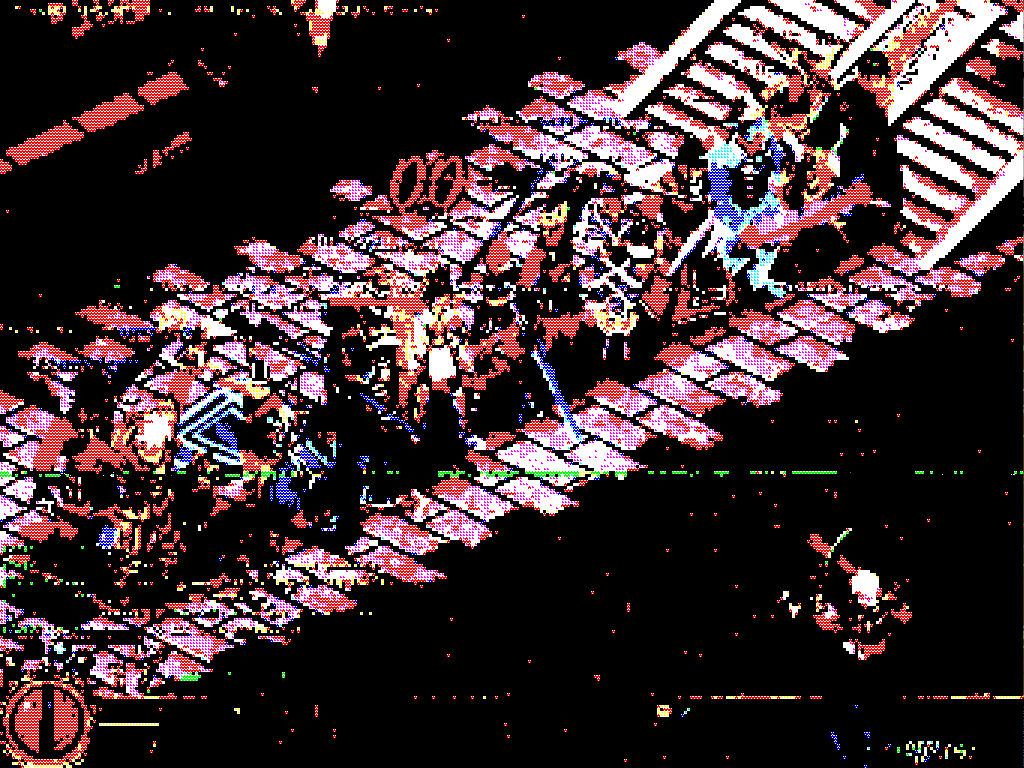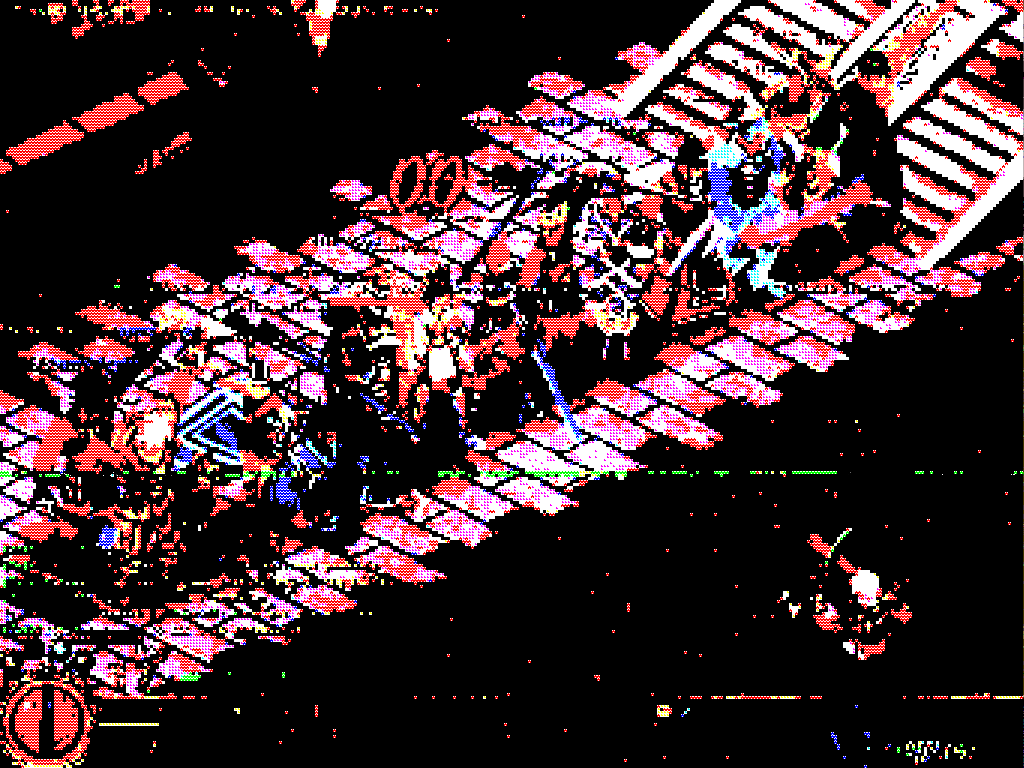- Pijus
My name is Pijus Antanavicius, I’m, what is it, 25 years old, and I’m in Europe, Lithuania, Vilnius, the capital. And what else was it you were asking, when did I lose interest?
- David
How did you come to lose interest in games, and when?
- Pijus
Hmm. I didn’t lose it instantly, it was just gradually decreasing, I think. And over the last couple years, last two or three years I just enjoyed playing games less. I would still go on sort of binges of playing, you know, playing like several hours a day every day with a game but it became more and more rare. And it’s hard to say what made it happen, I can’t --
- David
Well, so what sort of games were you playing? Because I think often we do this where we talk about games, there’s the assumption you’re not talking about Facebook games, you’re probably talking about console games. What were you playing before, when you were playing?
- Pijus
You know, I’m actually a rabid console hater.
- David
[Laughs.] Yeah, why?
- Pijus
And the games I used to play are like, action RPGs I think would be my favorite genre. Like, you know, Diablo, Elder Scrolls games, Torchlight. So yeah, those are probably my favorite games, I also played some strategy games but most of them are a bit too hard for me.
- David
But you did you say you were console hater, like you --
- Pijus
Yes, yes. Pretty much so.
- David
[Laughs.] Why do you rabidly hate consoles? [Laughs.]
- Pijus
Well, probably my favorite game of all time is Elder Scrolls III: Morrowind. And I played it lots and lots and lots. And uh -- I actually took Russian in school so I could understand the game, because I had the Russian version first. So anyway, I really loved this game. And then they started releasing like, teasers and trailers for Elder Scrolls IV: Oblivion, and I was excited and then I got the game and I played it and then I just had this terrible feeling of annoyance with the game and just frustration and disappointment. And I ascribed it to the fact that it was like -- like it was made primarily for consoles. And that’s like -- I blamed them for the game being different than I wanted. And I’m still not over it. Until this day.
- David
[Laughs.] Well, I mean -- you feel that they made a game different from what you wanted?
- Pijus
Um, I guess -- yeah. The game was different than how I would have preferred, and I thought that was because they made it like console-first. And that included some limitations, like the UI had to be fit for consoles, and so it was just awful on the PC. And I was so annoyed with it. And I just felt like, you know, the people who made the game failed to consider what I like and this made me pretty upset.
- David
So you blame consoles for that?
- Pijus
Um, I suppose I don’t blame like the machines themselves, but just the fact that the developers chose, you know, them over me.
- David
[Laughs.] I mean, I suppose from a business standpoint it makes sense where you know, companies want to be on as many platforms as possible. I think it’s a little bit taken to an extreme today where you see far fewer console exclusives -- you’re a little younger than me, but do you remember when, you know, exclusives used to be exclusive on one platform instead of on two or three or four platforms?
- Pijus
Um, hmm. Not really.
- David
Yeah.
- Pijus
I mean, I never had any consoles, so if they had exclusives I wasn’t aware of them. So it’s hard for me to say.
- David
So, well, I don’t know. Are you bored with games? It sounds like you still have some strong feelings even if there are some negative ones. Where do you stand with games? You say you play a lot less than you used to but you’ve mostly stopped, right?
- Pijus
Yeah. Mmm, I think boredom is part of it.
- David
Boredom with what?
- Pijus
Like, you know when you play a game for a long time and eventually you get bored with it?
- David
Sure.
- Pijus
I think this point where you get bored with a game has started to come really fast for me. And so sometimes I just – I don’t even bother to start playing most games these days.
- David
Well – I don’t know. Like, the people who made Halo – they talked about trying to find "the perfect 30-second loop of fun." Have you heard that before, that phrase?
- Pijus
Yeah, I’ve heard about it.
- David
So, I feel like that’s something that happened post-iPhone games. And I don’t blame Apple and I don’t blame iOS games. But I feel like pre-Apple bigger games used to be less monotonous. Like, I feel like there are these loops going on where you sort of do other things but you remain stuck in that same loop. Like I think it’s really easy to see that in RPGs. Not all RPGs, but I sort of feel like a lot of other genres started doing that as well. I used to call it "the iOSification of bigger games." This was years ago.
It sort of made it feel like no matter what you were playing it was going to be the same thing over and over. And again, you’re a little bit younger, so you have a different perspectivee: Do you feel like games used to not be like that, or do you feel like you don’t even know what I’m talking about?
- Pijus
I definitely relate to the loop thing. Like when I think of the later games that I played, Path of Exile, it’s certainly like -- it feels like it has, you know, that, the loop. You know, like you kill a group of monsters, you get some loot, you feel happy and you go on to the next group and the next group and so on. And you get a skill point and you feel happy and --

- David
[Laughs.] Yeah. You kill things, you feel happy.
- Pijus
Yeah. And let’s see, what else. FEAR, the game, the first one? I feel like it also has these very clear loops. Like you go from room to room and you kill the soldiers and it’s exciting when you do it and then there’s some scary moments that are sort of rhythmical and, uh -- I’m not sure if that’s a really bad thing.
- David
I don’t think it’s a bad thing. I think what is a bad is that there’s like – either the reality that there’s less variety and it’s like it’s a loop of being stuck in these loops in games. It’s either a bad thing of there being a perception that’s all there is or the reality is is that is actually all there is. I think that’s bad, where there’s just a lack of variety of what’s available to us. That’s all.
- Pijus
Hmm.
- David
But that may not be your perception.
- Pijus
I’m not -- I’m not aware enough to tell either way. You know, I don’t know if that’s all there is. I’m not sure about this, but it could be.
You know, part of why I’m losing interest is because I don’t really have a good budget for games. Like, I play on my PC that’s really old and I can’t play the new games even if I wanted to. And also I don’t have money to spend on games, so this also gives a really -- gives a lot of frustration to me, because, well, if I had a lot of disposable income, I could just buy a lot of games and try them all out. But now it’s harder to do it. And I guess -- I’d like to admit of a feeling I have is that I wish there were games that were sort of targeted to me. You know, the same way that I wished Oblivion was more targeted to me. And I wish there were some developers that were making games for weak computers that had poor graphics but that were fun to play.
- David
I mean, isn’t that always the way that’s been with computer gaming, though?
- Pijus
Yeah. And, well, I’m now frustrated with games, so maybe it should change.
- David
Something that you mentioned in your emails I was curious about is you said your taste in games isn’t exactly refined. What did you mean by that?
- Pijus
Well, I just threw that word out, but let’s see. I don’t really like like the critically acclaimed games. It’s like liking popcorn movies, you know? Like my favorite movies are like the superhero movies and I don’t really have an interest in Citizen Kane or Shawshank Redemption. You know, I know they’re good, I just don’t really want to watch them. So, I feel it’s the same with games.
- David
It was an interesting choice of words, and I’m just curious, what is someone with refined taste in games? What does that look like? What does that mean?
- Pijus
Hmm. The first thing that pops into my mind is like, someone who writes for Rock, Paper, Shotgun, would have a refined taste in games. And they have -- hmm, I don’t really know very well.
- David
That’s okay. Well, I mean, so you’re talking about games writers and you mentioned one outlet. What sort of games do you feel games writers favor?
- Pijus
Well, as my interest in playing games decreased, so did my interest in games media. I haven’t really paid attention to the games websites for a while. And I’m not sure if I can answer that question very well. I guess games writers have a more open mind towards games and they are more willing to try games that maybe they don’t feel like trying. And they’re more open to finding the good things in them?
- David
I feel like there are maybe some writers like that but I feel like the stigma some games writers have is that they don’t like a lot of games or, like – I’ve had some developers ask me, "Why don’t you have someone who loves horror games review the horror game I made? Why does someone who typically plays sports games, why are they covering my horror game?" Like, I almost feel like people who write about games specialized in a way that the typical consumer does not. Like, I don’t know, do you feel like --
- Pijus
I don’t really feel that way. I think I feel the opposite, that games writers have a broader taste from the general player.
- David
Oh, that they play more?
- Pijus
Yeah, and more variety. And they enjoy a variety.
- David
Well, so when you were paying attention to games media though, what impact did it have in what you interested in buying or checking out?
- Pijus
Well, it had some impact, like I remember a preview for Diablo III. It was describing like, how the skills are and how it feels to play and that certainly had an impact on, you know, how I viewed the game Diablo III and -- I ended up buying it for an exorbitant price. The most expensive game I ever bought.
- David
How much was it?
- Pijus
Sixty Euros.
- David
Yeah.
- Pijus
So yeah, it did have an impact. You know, it informed me what the game is like and then I could have some sort of reaction to it, and you know, feel excited or feel disappointed.
- David
What trends did you notice in the things that games outlets would cover and that they would not cover? What’s something you feel that you would never read about in a games outlet having to do with games?
- Pijus
I can’t really say I noticed any trends, but I did have -- a feeling I had about games writing is that it didn’t really reflect how I felt.
- David
How do you mean?
- Pijus
Like, when it was announced that Diablo III, again, had like -- always-online features and I got really upset about that and really annoyed. At least the games outlets I was reading, they didn’t seem as upset about it as I was. It just feels like, you know, they don’t get it, or they don’t see, you know -- I guess I wanted them to reflect my voice and they didn’t.
- David
What changed that made you just play less? You sort of mentioned part of it before. Is it that games got too expensive, is it that you felt like games sort of got bent or warped a little bit to be more friendly to more platforms, and so they became a little less special, or what?
- Pijus
I think my answer’s going to be pretty long to this one.
- David
[Laughs.] That’s fine.
- Pijus
So there’s, a variety of factors – part of it is like, you know, personal stuff, growing older, I still haven’t got my future sorted, so I need to be productive and create something, so, you know, part of getting away from games is that when I’m playing I feel like the time is just going totally to waste and I should be doing something productive, so that’s part of it. But there are other things too, like, you know, I see here your first question, "How do you not feel included by videogames?" And this really resonated with me because --
- David
[Laughs.] I haven’t even asked you about that yet.
- Pijus
As I said I don’t have a large budget for games, so I like when games are free, and so I played some free-to-play games, like I played Path of Exile, I played Tribes: Ascend, I played MechWarrior Online, I played Conquer Online, which is like an old free-to-play MMORPG. And you know all these games, when I played them, I kind of feel unwelcome. Maybe you know what I mean. Like when you when you play those free-to-play games, you know, at first glance the game seems fun, but then it sort of hits you in the face with, you know, "You give us money, you can have more fun." That feels bad to me.

- David
Well, what specifically feels bad? Is it that you’re not paying for it or is it that they’re asking for it, or what?
- Pijus
They’re giving me a game to play and then it turns out to be kind of a scam. Because the game isn’t actually as fun as it seemed at first and like they expect me to pay. I’m not expressing this very well, but yeah.
- David
No, you’re fine. You’re figuring it out. I think you know, some might take issue -- like of course they’re asking for money because they worked on it.
- Pijus
I would be much more happy to pay like $10 for something like Tribes: Ascend rather than just have it be free-to-play and pay like $10 for buying weapons or stuff. You know? Because I feel like the progression that is in free-to-play games is like part of the gameplay experience. You know, unlocking weapons and things like that, and when you make players buy those things, like it warps the experience of the game in a way that I don’t like.
- David
Well it kind of breaks the fourth wall. It reminds you not just that you’re playing a game, but that you’re using a piece of software. And it’s prompting you not as a the character but as the consumer to do something.
- Pijus
Yeah. You know, pretty often I feel like business is evil and when a game is frustrating and then it gives me the opportunity to make it un-frustrating by paying $10 that really rubs me the wrong way.
- David
Well, what’s evil about business to you?
- Pijus
I just feel like it takes things over and if something was about like, art, then you add business and then the business takes it over and the thing becomes only about business. You know, because like the artist needs to eat and to eat he needs food and to buy food he needs money. So, like – like the artist needs to be involved with business to be able to create his art but I think often times what happens is like, the business part of, let’s say a games company takes over and the concerns of how good this game can be get buried under the desire to sell as many copies and things like that.
- David
I mean videogames have always been in this uncomfortable dance between business and art. I think what’s been happening is that while a lot of people have been debating whether videogames are art, the business side of things took over.
- Pijus
Yeah. I think it doesn’t matter if games are art.
- David
Oh, it doesn’t matter at all.
- Pijus
Games are creations and I think they deserve to be created to the best of our ability instead of, you know, hamstringing them to help keep a business running.
- David
Do you feel like games are not as good as they used to be?
- Pijus
That’s kind of hard to answer because games get older and sometimes they just feel out of date. So it’s a bit hard to compare games from long ago to games to now.
- David
Why do you think games become so important to people and then they seem to lose that importance?
- Pijus
Hmm. When I was playing games as a teenager I really didn’t know why I was doing it. I just felt like doing it a lot. And these days it’s also hard to say why I do it. But I think -- you know, you play the games to get away from other things in your life. Whether it is you’re trying to distract yourself from something that is hard in life or just trying to relax after doing something intense in work or something like that. For me, I think I went from just focusing intensely on playing games to trying to create something and then focusing on that. And I’m not sure if that’s like part of growing up, or --
- David
I don’t know, I mean, do you think as we age we approach games differently? Like, we do look for different things from them?
- Pijus
For myself I’m not sure that I can say that, but, like I watched a lot of stuff with Jonathan Blow, lots of talks and stuff like that, and for him that is true, from what I was able to observe. But then again, I also have a friend who’s like in his forties now and he still plays games like a maniac. You know, we used to play Diablo years ago, and he played for an ungodly amount of hours before that, and he’s got like all the unique items except for like, 12 of them. And you know, he still plays Minecraft at probably the same pace he did like -- as he played Diablo 10 years ago so, I can’t really say that -- you know, games change as we age.
- David
I think it’s just like no matter what age you are you still like to have fun.
- Pijus
Yeah. Hmm.
- David
When you hear the word "gamer," what does that conjure up in your mind? What picture does that give you?
- Pijus
That gives me the image of someone to whom games are really important. And I don’t know -- I was like, having a sort of thought about you know, games writers and businessmen and gamers and, like, a games writer to me is someone to whom writing is important and to whom games is important. So I think gamer and the writer is much together.
I can’t say that I hear anything about what it means to be a person who plays a game in the media. I can’t say that I have a picture of a gamer from consuming games media, you know? Obviously games writing is about conveying the feeling that a person who plays games has but I don’t have like a full image of what a gamer is from that.
- David
Do you feel like games are less creative on the whole these days?
- Pijus
On the whole I think not but on AAA, like on the big high-profile games, I think so, yeah.
- David
How do you view what’s coming out of that space?
- Pijus
From the high-profile games?
- David
Yeah.
- Pijus
My perception is that you it’s like very carefully crafted experiences with very clear boundaries of what you can and can’t do. And that’s not really appealing to me. Besides the fact that you know, the games cost $60 and that you need to sign into Origin and stuff like that. I think I see the big games as being a bit sterile -- very clear boundaries and very crafted experiences.
- David
A lot of people have said similar things and I feel also that bigger games are less creative and there are certainly economic factors -- I don’t know if I can defend how uncreative they’re being, but I understand it. Do you think it matters?
- Pijus
That they’re less creative?
- David
Yeah. Do you think it matters, or is it hurting anybody?
- Pijus
I think it certainly matters. Like, there was a video on YouTube made by Super Bunnyhop about how all the games are the same now. It’s like Alien: Isolation, Watch Dogs, other games, and they all have like a set of similar features. And in the video he said like, "I still enjoy these games, even though they’re all the same." Maybe he didn’t phrase it exactly like that, but that’s what I got from it. And I think there will come a point when the sameness is just going to be glaring and it will be hard to enjoy the games then.

- David
I mean, my feeling is it’s not going to be glaring. My feeling is that it won’t be glaring because there is this tradition of people moving on. You know, you’re 25, I’m 32. And if people move on and don’t buy anymore and they continue to be same-y, who’s going to still be around to do something about it? Because people will keep buying what keeps getting put out.
- Pijus
You know, I think maybe what’s going to happen is the older people will stop buying like the high-profile games but there will be young people growing up and they will buy them and for them it will be new and exciting. You know, because if you’re like 13 and you play Assassin’s Creed VIII for the first time, it’s still going to be exciting and amazing to you, right?
- David
Yeah. Where will Assassin’s Creed VIII be set?
- Pijus
That’s a good question. I don’t know where the previous ones were set so, it’s hard to say.
- David
Let’s say it’ll take place on the Moon, on a base that’s just supposed to be like Texas.
- Pijus
[Laughs.] Like I said, the 13-year-olds will discover Assassin’s Creed VIII and to them it’ll be amazing because it’ll be the first game that they play, let’s say, right? It’ll still sell millions of copies. So what’s going to happen is Assassin’s Creed and Call of Duty’s going to go on forever because new people will be discovering it and it’ll not change. That’s what I think is going to happen.
- David
What do you think of that?
- Pijus
Well that’s -- I think it’s kind of a shame, because I think games have a lot of possibilities and you know, I think it would be good to explore them widely. I think it would be cool if like you could have a big-budget exploration of some crazy idea and like my feeling is that’s not going to happen any time soon.
- David
Yeah, me too. Well, that’s a very sad note to end on. [Laughs.]
- Pijus
Well, let’s find something positive.
- David
We don’t have to.
- Pijus
Not everything is over for games. I think the non-mainstream games, the indie games or what have you, are sort of evolving also in kind of an opposite direction than the AAA games. Because now you have games that are just three minutes of barely interactive. Like those games Succulent, by Radiator Yang and other games that are just like three minutes long and just convey a certain feeling -- like when mainstream games are evolving towards bigger, higher production values, bigger budgets, more polished -- other people are looking to go in the other direction. So I think that’s going to lead somewhere.

- David
Yeah, but Assassin’s Creed VIII can also have more creativity as well.
- Pijus
Well, yeah of course. It would be nice to have not just like now we have super-high budget mainstream games and then on the opposite side we have these really small indie experiments and there are some -- actually now there is quite a lot I think of like, mid-tier indie games that are -- they’re not AA even, if they’re A games.
- David
[Laughs.]
- Pijus
I feel like there’s a lot of those but you know. I heard someone mention like that they’re used to be AA games, so it would be nice to have those back.
- David
Yeah, there used to be.
- Pijus
Can I just add another depressing note?
- David
Please do, this will be the depressing note we end on, I feel. [Laughs.] Go ahead.
- Pijus
You know, today I was reading through your questions and I was remembering Dead Space 3 as something that might come up. And Dead Space 3, I haven’t played it but you know, all of YouTube was buzzing how awful it is with all the microtransactions and Origin and not working and all that stuff and I’m sure the people who made the game -- who actually like made the models and drew the textures and wrote the code, they worked really hard and I’m sure they did a good job and did their best, and then I feel like somebody saw the need to see how far they could push monetization with Dead Space 3.
When you play Dead Space 3 and it tells you to pay $10 for a gun or whatever, the tendency is you blame everyone involved with the making of the game. You know? The team who made the game, they’re bad because they put these microtransactions and they want money and they made us use Origin and so they’re terrible. Although the people who made the game, like they actually worked hard and they wanted it to be good and then there were like other things attached onto it that just soured everything.
We tend to blame everyone -- and by we, I mean like gamers or consumers. We tend to blame everyone who made the game.
- David
Why do you think that happens?
- Pijus
I think because probably the same reason why you’re making these interviews. Because developers are all locked up in a big black box and you know, the black box releases a PR person every once in a while to say something about the game that’s it. So they all just look like one entity when there’s like a lot of people in the game, making it.
I kind of believe in voting with my wallet. And it’s kind of easy to do these days because all the bad games cost $60. But I would really like to play Bulletstorm, it looks really fun. But when I tried to get it on Steam, what was it? I think it wasn’t available in my region or something? And that pissed me off really badly. And then I looked on other digital distribution sites and it says, like requires third-party authentication servers or something, a.k.a. Origin, I was just like, I’m not having any of that. So. But I don’t think the average player cares about, you know, things like what are the trends in games and what do they mean and how to affect them, so you know, they just kind of go along with whatever the business people come up with. The hassle of there being microtranscactions or annoying DRM isn’t enough to discourage people from playing the games they want, so the trend continues.
Thanks for reading! Please consider supporting my work directly.
Send a tip to David
